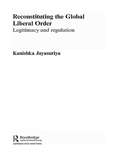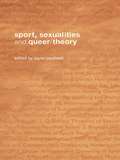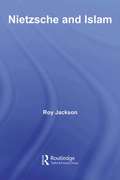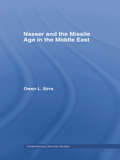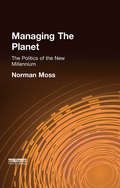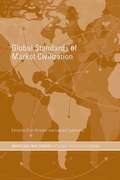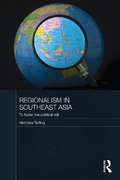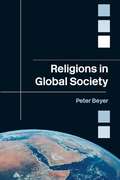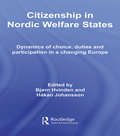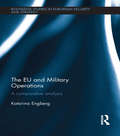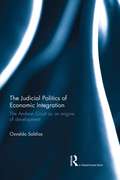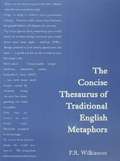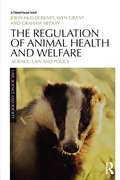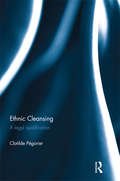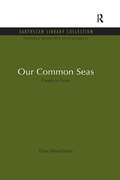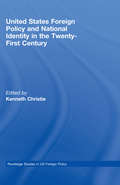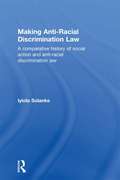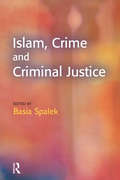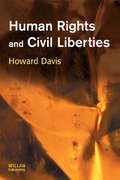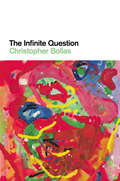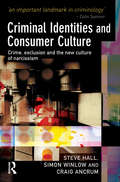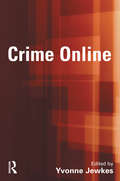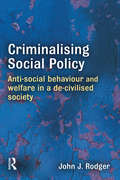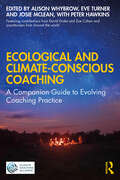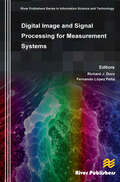Special Collections
Benetech’s Global Certified Accessible Titles
Description: Benetech’s GCA program is the first independent third-party EPUB certification to verify ebook accessibility. By creating content that is born accessible, publishers can meet the needs of all readers. Learn more: https://bornaccessible.benetech.org/
- Table View
- List View
Reconstituting the Global Liberal Order
by Kanishka JayasuriyaThe events of September 11, 2001 were a significant watershed in the emerging global order. However, the nature and consequences of this changing global order remain unclear. This book argues that this new order is as much the result of issues relating to the evolving methods and forms of governance, as of the new role and position of the United States in the world system. Using an innovative framework, derived from the work of Carl Schmitt, Kanishka Jayasuriya explores the nexus between domestic political and constitutional structures and the global order, and examines how the post-war framework of international liberalism is crumbling under the new pressures of globalization. As well as looking at the implications of 9/11 for the global order, this new study: relates the events of 9/11 to the deep transformations of the post war global order emphasizes the importance of the rise of the new regulatory state examines the new politics of fear in liberal democracies including the US, UK and Australia studies the appropriation of the 'language of the left' by conservative forces explores the illiberal outcomes of actions undertaken in the name of liberalism. This unique and timely study will be of great interest to students and researchers of international political economy, globalization and international political theory.
Sport, Sexualities and Queer/Theory
by Jayne CaudwellThe first book focusing exclusively on this subject, Sport, Sexualities and Queer/Theory captures the newest and best writing on an emerging focus of study that brings in perspectives from a number of disciplines including sports studies, gender studies, sociology, cultural studies, lesbian and gay studies, and queer studies. An accessible introduction to this dynamic field, this is an explorative analysis of lesbian, gay, transgender, transsexual and intersex people’s experiences of sport as well as a rigorous theoretical consideration of sociological and political issues. Bringing together in a single source an exciting array of contributions, this is an ideal source of inspiration for anyone involved in this rapidly growing field, and fills a need for an excellent introduction to the main themes and issues.
Nietzsche and Islam
by Roy JacksonIn the light of current events, particularly the ‘post September 11th’ debates with much focus on aspects of the ‘clash of civilisation’ thesis, the issue of Islamic identity is a crucial one. Whilst Friedrich Nietzsche was addressing an audience of a different culture and age, his own originality, creativity, psychological, philological and historical insights allows for a fresh and enlightening understanding of Islam within the context of our modern era. In this book, Roy Jackson sets out to determine: Why did Nietzsche feel inclined to be so generous towards the Islamic tradition yet so critical of Western Christianity? How important was religion for Nietzsche’s views on such matters as moral and political philosophy and how does this help us to understand the Islamic response to modernity? How does Nietzsche’s distinctive outlook and methodology help us to understand such key Islamic paradigms as the Qur’an, the Prophet, and the ‘Rightly-Guided’ Caliphs? Nietzsche and Islam provides an original and fresh insight into Nietzsche’s views on religion and shows that his philosophy can make an important contribution to what is considered to be Islam’s key paradigms. As such it will be of interest to a diverse readership and will provide useful material for researchers when thinking about religion, Islam and the future.
Nasser and the Missile Age in the Middle East
by Owen L. SirrsEgyptian efforts to acquire long-range surface-to-surface missiles in the early 1960s carry important lessons for our time, when weapons of mass destruction and charges of politicizing intelligence are key issues. This new study traces the history of the early Egyptian ballistic missile program, which began with the successful recruitment of German scientists who had experience in Hitler’s V1 and V2 missile projects. Yet even as these Germans began their work on developing missiles for Egyptian President Gamal Abdel Nasser, Israeli intelligence was busy collecting information on their activities, sparking a crisis in the Israeli leadership as top Israeli officials anxiously debated strategies to grapple with this new threat to their national security. Ultimately, they adopted a multifaceted approach that included intimidation of the scientists and their families, appeals to the West German government to order the scientists’ recall and an attempt to involve the US government in the intricacies of the Arab-Israeli conflict. Drawing extensively on material from recently declassified US government documents, this new major work demonstrates how Nasser’s missile program played an instrumental role in cementing the US-Israeli national security relationship. The book concludes with several key lessons that can help stem the global proliferation of advanced weapons. This book will be of great interest to scholars of proliferation, international relations, the Middle East, disarmament and security studies in general.
Managing the Planet
by Norman MossWe are at a watershed of history. The human race is now so numerous and its technological power so great that we are having an unprecedented impact on the biosphere, the entire planet. The need to control this impact is giving rise to a new kind of politics - the politics of the planet. The most urgent problem we face is that of climate change. This book gives a vigorous and candid account of how governments tentatively felt their way to the first international agreements on climate change and the ozone layer, how these work, and the long-term implications for global governance. It points to the roles that businesses and ordinary citizens can play, and the changes we can expect in our daily lives. This is an area in which politics, technology and economics meet. In this sweeping and energetic book, the author goes on to look at the major planetary issues that confront us now or that are close over the horizon, and the ethical issues of our relationship to our environment that they raise. Amid the dangers, he finds ground for hope. Anyone with an interest in the human condition as we spin further into the new century will find this an enlightening and rewarding book. Originally published in 2000
Global Standards of Market Civilization
by Brett Bowden and Leonard SeabrookeGlobal Standards of Market Civilization brings together leading scholars, representing a range of political views, to investigate how global 'standards of market civilization' have emerged, their justification, and their political, economic and social impact. Key chapters show how as the modern state system has evolved such standards have also developed, incorporating the capacity for social cooperation and self-government to which states must conform in order to fully participate as legitimate members in international society. This study analyzes their justification, and their political, economic and social impact. Civilization is a term widely used within modern political discourse its meaning, yet it is poorly understood and misused. part I explores the idea of a ‘standard of civilization’, its implications for governance, and the use of such standards in political theory and economic thought, as well as its historical application part II presents original case studies that demonstrate the emergence of such standards and explore the diffusion of liberal capitalist ideas through the global political economy and the consequences for development and governance; the International Monetary Fund’s capacity to formulate a global standard of civilization in its reform programs; and problems in the development of the global trade, including the issue of intellectual property rights. This book will be of strong interest to students and scholars in wide range of fields relating to the study of globalization including: international political economy; international political theory; international relations theory; comparative political economy; international law; historical sociology; and economic history.
Regionalism in Southeast Asia
by Nicholas TarlingRegionalism in Southeast Asia provides the reader with an historical analysis of Southeast Asia from the distinct perspective of regionalism. Southeast Asian history is usually written from a national point of view, which underplays the links between neighbouring states and nations and the effects of these bonds on the development of regionalism. This innovative book begins by defining the meaning of 'region' and 'regionalism' and then applies it to periods in history in Southeast Asia, looking at how patterns of regionalism have shifted through time to the present day. By focusing on the regional perspective Nicholas Tarling gives an original treatment of Southeast Asian history, its political dynamics and its international realtions. Regionalism in Southeast Asia completes a trilogy of books on Southeast Asia by Nicholas Tarling published by Routledge, the other two are Nationalism in Southeast Asia and Imperialism in Southeast Asia.
Religions in Global Society
by Peter BeyerPeter Beyer, a distinguished sociologist of religion, presents a way of understanding religion in a contemporary global society - by analyzing it as a dimension of the historical process of globalization. Introducing theories of globalization and showing how they can be applied to world religions, Beyer reveals the nature of the contested category of ‘religion’: what it means, what it includes and what it implies in the world today. Written with exceptional clarity and illustrated with lively and diverse examples ranging from Islam and Hinduism to African traditional religions and new age spirituality, this is a fascinating overview of how religion has developed in a globalized society. It is recommended reading for students taking courses on sociology of religion, religion and globalization, and religion and modernity.
Citizenship in Nordic Welfare States
by Håkan Johansson and Bjørn HvindenThis book offers an innovative analysis of the ways in which the relationship between citizens and welfare states - social citizenship - becomes more dynamic and multifaceted as a result of Europeanization and individualization. Written by interdisciplinary contributors from politics, sociology, law and philosophy, it examines the transformation of social citizenship through a series of illuminating case studies, comparing Nordic countries and other European nations. Dealing with the following areas of national and European welfare policy, legislation and practice: activation – reforms linking income maintenance and employment promotion scope for participation of marginal groups in deliberation and decision-making impact of human rights legislation for welfare and legal protection against discrimination and social barriers to equal market participation coordination of social security systems to facilitate cross-border mobility in Europe pension reform – efforts to make pension systems sustainable. Citizenship in Nordic Welfare States will be of interest to students and researchers of social policy, comparative welfare, social law, political science, sociology and European studies.
The EU and Military Operations
by Katarina EngbergThis book is a comparative study which aims to answer the question: under what circumstances does the EU undertake military operations? Since 2003, the EU has carried out six military operations. What accounts for this historic development? The EU and Military Operations examines the dynamics behind the EU´s collective use of force and situates the EU in the context of a global division of labour with regard to military crisis management. It centres on the study of two main cases of EU military operations: the non-case when an operation was planned in the Lebanon war 2006 but did not occur, and the positive case of EUFOR RD Congo that same year. Drawing upon these findings, the author creates an innovative analytical framework based upon the techniques of defence planning, and applies this to the cases studies with the purpose of identifying the main driving and inhibiting factors behind the operations. Key findings derived from this analysis include the growing importance of local actors in facilitating or impeding the EU´s deployment of military force and the enhanced role of regional organisations as security providers. The book will be of much interest to students of European security, EU politics, strategic studies, humanitarian intervention, security studies and IR in general.
The Judicial Politics of Economic Integration
by Osvaldo SaldiasThe Judicial Politics of Economic Integration analyses development strategies and regional integration in the Andean Community (the former Andean Pact), focusing on the establishment of the Andean Court of Justice and its case law, as well as the intellectual underpinnings that made such an impressive reform possible. The court is a transplant taken from the European integration process, and it materializes the visions, expectations, and dreams of the transnational development movement of "integration through law". The book discusses the outcomes of the Court in light of the debates about judicial reform in the process of development and regional integration. Although clearly confirming several earlier claims that "one size does not fit all", Osvaldo Saldias provides new insights into how legal transplants adapt and evolve, and how we can learn much more about legal reform from a project that presumably failed than from successful copies. The Andean Court of Justice is a remarkable example of an institution capable of adapting to political and economic challenges; therefore, in times of a severe European economic crisis we should not forget that we might improve our understanding of European integration by looking at developments in other regions. An interesting new study with an international focus, this book will be a fascinating read for students and scholars of Law and Latin American Studies.
Concise Thesaurus of Traditional English Metaphors
by Dick WilkinsonThis absorbing collection of metaphors includes a variety of expressions with figurative meanings, like similes, proverbs, slang and catchphrases. It is the result of a lifetime of work on dialect and metaphor and gives an overview of the folk wisdom expressed in figurative expressions. The author draws on his extensive contact with the rural cultures of Dorset, Cornwall, Yorkshire and Lancashire, but has also included a range of sayings from North America, Australia, Scotland and other English speaking countries. With revised contents and an improved index to make individual entries easier to find, the Concise can be used to check the meaning and the origin of an expression or to avoid mixed metaphors, anachronisms and incongruities. It is a joy to browse long after your original query has been answered.
The Regulation of Animal Health and Welfare
by Wyn Grant and John McEldowney and Graham MedleyThe Regulation of Animal Health and Welfare draws on the research of scientists, lawyers, economists and political scientists to address the current and future regulatory problems posed by the issues of animal health and disease. Recent events such as the outbreak of mad cow disease, epidemics of foot and mouth disease, concerns about bluetongue in sheep, and the entry into the food chain of the offspring of cloned cattle, have heightened awareness of the issues of regulation in animal disease and welfare. This book critically appraises the existing regulatory institutions and guiding principles of how best to maintain animal health in the context of social change and a developing global economy. Addressing considerations of sound science, the role of risk management, and the allocation of responsibilities, it also takes up the theoretical and practical challenges which here – and elsewhere – attend the co-operation of scientists, social scientists, lawyers and policy makers. Indeed, the collaboration of scientists and social scientists in determined and regulatory contexts such as that of animal disease is an issue of ever-increasing importance. This book will be of considerable value to those with interests in this issue, as well as those concerned with the law and policy relating to animal health and welfare.
Ethnic Cleansing
by Clotilde PegorierThis book confronts the problem of the legal uncertainty surrounding the definition and classification of ethnic cleansing, exploring whether the use of the term ethnic cleansing constitutes a valuable contribution to legal understanding and praxis. The premise underlying this book is that acts of ethnic cleansing are, first and foremost, a criminal issue and must therefore be precisely placed within the context of the international law order. In particular, it addresses the question of the specificity of the act and its relation to existing categories of international crime, exploring the relationship between ethnic cleansing and genocide, but also extending to war crimes and crimes against humanity. The book goes on to show how the current understanding of ethnic cleansing singularly fails to provide an efficient instrument for identification, and argues that the act, in having its own distinctive characteristics, conditions and exigencies, ought to be granted its own classification as a specific independent crime. Ethnic Cleansing: A Legal Qualification, will be of particular interest to students and scholars of International Law and Political Science.
Our Common Seas
by Don HinrichsenMost of the world's population lives on or near the coasts. Every nation not completely landlocked has used the sea as its supposedly self-cleansing garbage dump. Now the effects are being felt. There is not a coast in the world which is not dangerously polluted. Sewage, oil, plastics, industrial effluents, radioactive waste have been added to ungoverned development, all of which are busily destroying otherwise robust inshore eco-systems. Hinrichsen, basing his work on United Nations Environment Programme (UNEP) research and his own extensive travels, has described the situation in the Mediterranean, the Gulf, the Indian Ocean, the South-East Asian Seas and the Eastern Pacific. He covers both the disasters and the growing successes in dealing with them, and he points the way to the sort of international deal needed to rescue a vast resource in danger of complete destruction. His book is both a call to action and a sign of hope. Originally published in 1990
United States Foreign Policy & National Identity in the 21st Century
by Kenneth ChristieExamines the complex relationship between United States foreign policy and American national identity as it has changed from the post-cold war period through the defining moment of 9/11 and into the 21st century. Starting with a discussion of notions of American identity in an historical sense, the contributors go on to examine the most central issues in US foreign policy and their impact on national identity including: the end of the Cold War, the rise of neo-conservatism, ideas of US Empire and the influence of the 'War on Terror'. The book sheds significant new light on the continuities and discontinuities in the relationship of US identity to foreign policy.
Making Anti-Racial Discrimination Law
by Iyiola SolankeMaking Anti-Racial Discrimination Law examines the evolution of anti-racial discrimination law from a socio-legal perspective. Taking a comparative and interdisciplinary approach, the book does not simply look at race and society or race and law but brings these areas together by drawing out the tension in the process, in different countries, by which race becomes a policy issue which is subsequently regulated by law. Moving beyond traditional social movement theory to include the extreme right wing as a social actor, the study identifies the role of extreme right wing confrontation in agenda setting and law-making, a feature often neglected in studies of social action. In so doing, it identifies the influence of both the extreme right and liberalism on anti-racial discrimination law. Focusing primarily on Great Britain and Germany, the book also demonstrates how national politics feeds into EU policy and identifies some of the challenges in creating a high and uniform level of protection against racial discrimination throughout the EU. Using primary archival materials from Germany and the UK, the empirical richness of this book constitutes a valuable contribution to the field of anti-racial discrimination law, at both undergraduate and postgraduate level. The book will interest specialists and academics in law, sociology and political science as well as non-specialists, who will find this study stimulating and useful to expand their knowledge of anti-racial discrimination law or pursue teaching goals, policy objectives and reform agendas.
Islam, Crime and Criminal Justice
by Basia SpalekThis book brings together research into key aspects of the interconnections between Islam, crime and the criminal justice system in Britain, a particularly timely collection in the light of both the recent disturbances in several northern English cities as well as the impact of the events of 11 September 2001 and their aftermath. Chapters in the book focus on young Muslim men and criminal activity, Muslim women and their experiences of victimisation, the experiences of Muslim police officers, of Muslims in prison, issues of human rights in relation to Muslims in Britain, and the criminal justice policy implications of religious diversity. Main aims pursued through the book include issues of victimisation as perceived by Muslim communities, Muslim perspectives on crime and criminal justice, and ways of addressing issues of marginalisation and exclusion within Muslim communities. Overall the book provides an important contribution to debates over the role of Muslims in British society generally, as well as their experiences of and involvement in the criminal justice system and the policy implications that arise from this.
Human Rights and Civil Liberties
by Howard DavisThis book provides a wide-ranging and accessible textbook covering the main areas of civil liberties and human rights law as it applies to England and Wales, meeting the requirements of undergraduate law syllabuses. The book sets out not only the legal rules, common law and statutes which relate to the field of civil liberties and human rights, but also the arguments and debates which have surrounded the development of an increasingly controversial area of the law, looking at the background principles underlying it, the coherence and consistency of the rules one to another and the social and political consequences of their application in practice. Particular attention is paid to the impact of developments in Europe, and especially to the Human Rights Act 1998 which has had an especial impact on the freedom to participate in determining public goals and the ability to preserve an area of personal autonomy. The book also addresses the nature and impact of the major statutory reforms in areas such as surveillance, protection of personal data and freedom of information, and devotes as well a chapter to the increasingly prominent issue of 'terrorism' and how the government and the law should respond.
The Infinite Question
by Christopher BollasIn his latest book Christopher Bollas uses detailed studies of real clinical practice to illuminate a theory of psychoanalysis which privileges the human impulse to question. From earliest childhood to the end of our lives, we are driven by this impulse in its varying forms, and The Infinite Question illustrates how Freud's free associative method provides both patient and analyst with answers and, in turn, with an ongoing interplay of further questions. At the book's core are transcripts of real analytical sessions, accompanied by parallel commentaries which highlight key aspects of the free associative method in practice. These transcripts are contextualised by further discussion of the cases themselves, as well as a wider theoretical framework which places its emphasis on Freud's theory of the logic of sequence: by learning to listen to this free associative logic, Bollas argues, we can discover a richer and more complex unconscious voice than if we rely solely on Freud's theory of repressed ideas. Bollas demonstrates, in an eloquent and persuasive manner, how the Freudian position of evenly suspended attentiveness enables the analyst's unconscious to catch the drift of the patient's own unconscious. He also shows that to stimulate further questioning is often of more benefit to the analytical process than to jump to an interpretation. Yet whatever fascinating course a session may take, neither the patient nor the analyst can halt the progress of the self-propelling interrogative drive. The Infinite Question will be invaluable to both the new student and the experienced psychoanalyst, read either on its own or as a practice-based extension of the theoretical ideas elaborated in its companion volume, The Evocative Object World (also published by Routledge).
Criminal Identities and Consumer Culture
by Steve Hall and Simon Winlow and Craig AncrumThis book offers the first in-depth investigation into the relationship between today's criminal identities and consumer culture. Using unique data taken from criminals locked in areas of permanent recession, the book aims to uncover feelings and attitudes towards a variety of criminal activities, investigating the incorporation of hearts and minds into consumer culture's surrogate social world and highlighting the relationship between the lived identities of active criminals and the socio-economic climate of instability and anxiety that permeates post-industrial Britain. This book will be of interest to undergraduates, postgraduates, researchers and lecturers in all fields within the social sciences, but especially criminology, sociology, social policy, politics and anthropology.
Crime Online
by Yvonne JewkesCrime Online is concerned to explore the dual capacity of the Internet to pervert and to democratize: it offers its users freedom, democracy, and communication with people around the world while at the same time generating anxieties concerning its potential to corrupt vulnerable minds and facilitate heinous crimes. This book provides a highly authoritative account and analysis of key issues within the rapidly burgeoning field of cybercrime. Drawing upon a range of internationally known experts in the field, and representing several different disciplines, Crime Online focuses on different constructions and manifestations of cybercrime and diverse responses to its regulation. It will be essential reading for anybody with an interest in one of the most exciting and fast moving areas of crime, policing and legislation.
Criminalising Social Policy
by John RodgerRecent legislative and policy developments in contemporary Britain have ushered in a new approach to criminal justice. The focus on criminal dispositions and welfarism has given way to a strategy which now involves the management of social exclusion, dysfunctional and anti-social families and situational crime prevention, leading to what has been widely characterized as the 'criminalisation of social policy' - and evidenced most recently by the anti-social behaviour and respect agendas. This book is concerned to explore, analyse and explain these developments. It seeks at the same time to situate the study of anti-social behaviour and response to it in the wider context of changes in the industrial and social structure, social polarization and inequality and the changing role of the welfare state in present-day society. This book will be essential reading for students taking courses in criminology, sociology, criminal justice, social policy and related subjects.
Ecological and Climate-Conscious Coaching
by Peter Hawkins and Alison Whybrow and Eve Turner and Josie McLeanThis book takes you on a seven-day journey with your guides: 60 coaches and thought-leaders from around the world. Through storytelling, poetry and other creative approaches, readers can follow this programme alone or with others and take a practical and empowering look at the impact of the climate emergency on their practice and how they might respond. Ecological and Climate-Conscious Coaching: a Companion Guide to Evolving Coaching Practice describes methods for adapting your practice while making a livelihood, reframing your work with urgency and action through exploration of the five-stage ‘Eco-phase’ cycle, moving from ‘Eco Curious’, ‘Eco-Informed’, ‘Eco-Aware’, to ‘Eco-Engaged’ and ‘Eco Active’. Designed to encourage discussion, raise awareness and increase confidence about stepping into a leadership role, the book explores the difference that coaching can make in the world as a result of greater eco-awareness and systemic understanding. Featuring powerful stories from around the world, and with a treasure trove of resources and practical tools and methods, supported by reflective and practical exercises, this book will be an inspiring read not only for those involved in coaching, supervision, mentoring and leadership development, but also for leaders.
Digital Image and Signal Processing for Measurement Systems
by Richard J. Duro and Fernando L´opez-Pe˜naThis book provides an overview of advanced digital image and signal processing techniques that are currently being applied in the realm of measurement systems. The book is a selection of extended versions of the best papers presented at the Sixth IEEE International Workshop on Intelligent Data Acquisition and Advanced Computing Systems: Technology and Applications IDAACS 2011 related to this topic and encompass applications that go from multidimensional imaging to evoked potential detection in brain computer interfaces. The objective was to provide a broad spectrum of measurement applications so that the different techniques and approaches could be presented.Digital Image and Signal Processing for Measurement Systems concentrates on signal processing for measurement systems and its objective is to provide a general overview of the area and an appropriate introduction to the topics considered. This is achieved through 10 chapters devoted to current topics of research addressed by different research groups within this area. These 10 chapters reflect advances corresponding to signals of different dimensionality. They go from mostly one dimensional signals in what would be the most traditional area of signal processing realm to RGB signals and to signals of very high dimensionality such as hyperspectral signals that can go up to dimensionalities of more than one thousand. The chapters have been thought out to provide an easy to follow introduction to the topics that are addressed, including the most relevant references, so that anyone interested in this field can get started in the area. They provide an overview of some of the problems in the area of signal and image processing for measurement systems and the approaches and techniques that relevant research groups within this area are employing to try to solve them which, in many instances are the state of the art of some of these topics.
